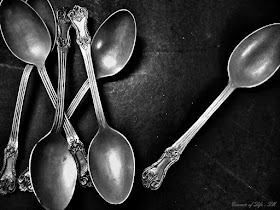PESAHA APPAM AND PAAL
 |
| PESAHA APPAM AND PAAL |
Writing the 400th Post for my Blog, I least had an idea what recipe I am going write, but it came as a flow and ended up writing about the Passover Bread colloquially called as Pesaha Appam/INRI Appam. Every year since blogging, I always wanted to post the recipe for this Pesaha Appam, but I literally wanted to perfect my recipe before posting it. I mastered this traditional recipe after numerous failed attempts. I need to mention that this year Pesaha Appam turned out to be really good and perfect, that immediately I got the picture clicked and started to write the post. Within 2 hours, my 400th Blog post got into shape.
This is my MIL's recipe and as an obliging Daughter in Law who wants to keep up the family tradition, I always make sure to prepare Kozhukatta for Oshana, Pesaha Appam for Maundy Thursday and needless to say Fruit Cake & homemade Wine for Christmas.
Preparation of Pesaha Appam is a tradition followed by Kerala Nasranis. Syrian Christians - A community well known in Kerala - according to tradition, are descendants from the converts of St.Thomas. St.Thomas was one of the twelve apostles. They are the oldest Christian community in India & use Syriac as their liturgical language and they are also known as Nasranis(from the birthplace of Jesus Christ - Nazareth).
The lifestyle and cuisine of Kerala Catholics speak their connection with St.Thomas and their Jewish/Hebraic heritage blended along with local Kerala culture. Their cuisine is rich and varied and reflects the cooking traditions of Portuguese, Dutch, Syrian, Arab along with the native culinary style. It is believed that the bread Jesus Christ broke and gave his disciples on the night of betrayal was UNLEAVENED, which was a celebration of the Jewish Passover, a practice we follow as the Lord's Last Supper on Maundy Thursday/Pesaha Vyazham(Thursday). Preparation for Pesaha starts on the Sunday of Oshana or Palm Sunday. Tender coconut leaves distributed on the Sunday of Oshana has great importance for the Pesaha celebration and a tradition of preparing Kozhukatta for Oshana is also prevalent among the community.
Pesaha Appam is the Passover bread or the unleavened bread is a trademark of Christian homes in Kerala. The Body and the Blood distributed by God himself on this holy night is replicated in every Christian household in Kerala in the name of Pesaha Appam and Paal. Pesaha Appam/INRI Appam is a kind of bread/appam prepared with a combination of Rice, Urad Dhal, Coconut, Shallots, Garlic and spices. The bread should be unleavened and the most important aspect, like in the case of Jewish Passover, during its preparation is to avoid traces of any old food or fermentation. The ground batter is not allowed to ferment, and the Pesaha Appam is prepared immediately after the batter is prepared. The Pesaha Paal is a concoction prepared with a combination of Jaggery Syrup and Coconut Milk flavoured with Cardamoms & Dry Ginger. The Concoction is thickened with rice flour. It is served instead of Wine on Maundy Thursday. There are quite a lot of tradition and norms to be followed while preparing and serving this Pesaha Appam & Paal.
The head of the family cuts the Pesaha Appam(into 13 pieces is the norm - Jesus Christ & his 12 Apostles) serves the Appam along with the Paal on the night of Pesaha Vyazhan(Maundy Thursday). If there are any leftovers, it is either consumed the next day which is Good Friday by the children during the day or in the evening by the adults – since it is a traditional fasting day. Any further leftovers are dried and consumed later, but never thrown away. For a detailed explanation on Pesaha Celebration, Click here...
I have added two different methods of making Pesaha Appam here. One is with the Rice Flour(Idiyappam Flour) and the other method is by grinding both Rice & Urad Dhal. We can use Raw Rice/Idli Rice for the recipe. Soak the rice for about 1- 11/2 hours and then grind it into a thick paste. Rest of the method remains the same for both the methods.
For more APPAM RECIPES, Click here...
Cuisine - Kerala (India)
Recipe Type - Appam(Passover Bread)
Difficulty - Medium
Serves - 3-4
Author - SM
Preparation Time - 15-25 Minutes
Soaking Time - 1 - 11/2 Hours
Leavening Time - 3-4 Hours(Optional)
Cooking Time - 20 -30 Minutes
For more FAMILY HEIRLOOM RECIPES, Click here...
HOW TO COOK PESAHA APPAM AND PAAL
INGREDIENTS :
METHOD 1 - Pesaha Appam with Idiyappam Flour:
Rice Flour - 1 CupWater - 1 - 11/2 Cups(Approximately)
Black Gram Dhal/Urad Dhal - 1/4 Cup
Garlic - 1 Clove
Shallot - 1 No.
Coconut - 3/4 Cup
Cumin Seeds - a Pinch
METHOD 2 - Pesaha Appam with Rice:
Raw Rice/Idli Rice - 1 Cup
Black Gram Dhal/Urad Dhal - 1/4 Cup
Garlic - 1 Clove
Shallot - 1 No.
Coconut - 3/4 Cup
Cumin Seeds - a Pinch
Garlic - 1 Clove
Shallot - 1 No.
Coconut - 3/4 Cup
Cumin Seeds - a Pinch
For Pesaha Paal :
Water - 1/2 Cup
Thick Coconut Milk - 1 Cup
Thin Coconut Milk - 2 Cups
Cardamom - 4-5 Pods
Dry Ginger - a Small Piece
METHOD :
METHOD 1 - Pesaha Appam with Idiyappam Flour:
- Soak Black Gram Dhal/Urad Dhal for about 1 - 11/2 Hours.
- Drain the soaked Black Gram Dhal and grind it in a mixer grinder or a blender along with Shallots & Garlic.
- Grind it into a smooth paste, sprinkling water at intervals.
- Remove the Urad Dhal Batter from the mixer-grinder and keep it aside.
- Grind Coconut along with a pinch of Cumin Seeds, Shallots & Garlic into a fine paste adding very little water & keep it aside.
- Meanwhile, boil 1 - 11/2 Cups of Water along with salt.
- Pour the boiling water into the Rice Flour and mix it without any lumps.
- It should be kneaded into a dough-like consistency, as for Idiyappam/Kozhukatta.
- Allow the Rice mix to cool.
- Add the ground Urad Dhal Batter and Coconut Paste to the Rice flour mix.
- Add enough salt to the mixture and mix it thoroughly.
- The Batter should be without any lumps.
- The Pesaha Appam batter should be slightly thicker(like an Idli Batter).
- Leave this aside for 3-4 Hours.
METHOD 2 - Pesaha Appam with Rice:
- Soak Black Gram Dhal/Urad Dhal for about 1 - 11/2 Hours.
- Soak Raw Rice/ Idli Rice for about 1 - 11/2 Hours.
- Drain the soaked Black Gram Dhal and grind it in a mixer grinder or a blender along with Shallots & Garlic.
- Grind it into a smooth paste, sprinkling water at intervals.
- Remove the Urad Dhal Batter from the mixer-grinder and keep it aside.
- Then drain the soaked Rice & grind it in a mixer grinder or a blender.
- Grind it into a smooth paste, sprinkling water at intervals.
- Remove the Rice batter from the mixer-grinder and add it along with the Urad Dhal batter.
- Grind Coconut along with a pinch of Cumin Seeds into a fine paste, adding very little water.
- Add the Coconut mixture to the ground Rice Urad Dhal batter and mix well.
- Add enough salt to the mixture and mix it thoroughly.
- The Pesaha Appam batter should be slightly thicker (like an Idli Batter).
- Leave this aside for 3-4 Hours.
Steam Cooking the Pesaha Appam
In a Steamer :
- Fill the Steamer/Pressure Cooker with 1-2 Cups of Water.
- Allow it to Boil.
- Grease the mould for preparing Appam with Coconut Oil/Ghee.
- Pour the Pesaha Appam Batter into the mould and spread it evenly.
- Can make a CROSS with the Palm Leaves and place it over the batter.
- Gently place the mould with Pesaha Appam Batter into the Steamer.
- Cover the lid of the Steamer and steam cook on a medium flame for about 12-15 minutes or until done.
- Remove the mould from the steamer and allow it to cool for about 5-10 minutes.
- Gently remove the Pesaha Appam from the Mould.
- Cut and serve it along with the Pesaha Paal.
In a Pressure Cooker :
- Fill the Pressure Cooker with 1-2 Cups of Water.
- Allow it to Boil.
- Place the grid inside the Pressure Cooker.
- Grease the mould for preparing Appam with Coconut Oil/Ghee.
- Pour the Pesaha Appam Batter into the mould and spread it evenly.
- Can make a CROSS with the Palm Leaves and place it over the batter.
- Gently place the mould with Pesaha Appam Batter and place it over the grid.
- Cover the lid of the Pressure Cooker, there is no need for using the Pressure Regulator/Vent Weight.
- Steam the Pesaha Appam on a medium flame for 20-30 minutes, or until done.
- Can check it by inserting a wooden skewer through the centre of the Appam. If it comes out clean, then the Appam is cooked.
- Remove the mould from the steamer and allow it to cool for about 5-10 minutes.
- Gently remove the Pesaha Appam from the Mould.
- Cut and serve it along with the Pesaha Paal.
For Pesaha Paal :
- Pour 1/2 Cup of Water to the Jaggery, boil this on high flame for few minutes.
- Lower the flame and boil for 5-6 minutes and strain for any impurities.
- Powder the Cardamoms and Dry Ginger into a fine powder and keep it aside.
- Mix melted Jaggery & Thin Coconut Milk, cook this on a low flame for few minutes stirring continuously.
- Add Thick Coconut Milk and leave it on a low flame for a few minutes, stirring it continuously.
- Add powdered Cardamoms and dry Ginger to the above and give a quick stir.
- Meanwhile, mix 1 teaspoon of Rice Flour(use roasted Rice Flour/Idiyappam Flour) in cold water. Make sure there are no lumps in it.
- Pour the Rice Flour mix to the Jaggery Coconut Milk concoction and cook on a low flame for a few minutes or until you get the desired consistency.
- Switch off the flame.
NOTES:
- I have used ready-made Idiyappam Flour in the recipe.
- The consistency of the Pesaha Appam batter should be slightly thicker(as Idli Batter consistency).
- Add required amount of water while grinding the dhal and mixing the rice flour.
- Steam cook the Pesaha Appam on a consistent(Medium) flame throughout the steaming process.
- Adjust the amount of Jaggery to suit your sweet preference.
- For a detailed recipe on HOW TO MAKE COCONUT MILK, Click here...







0 comments